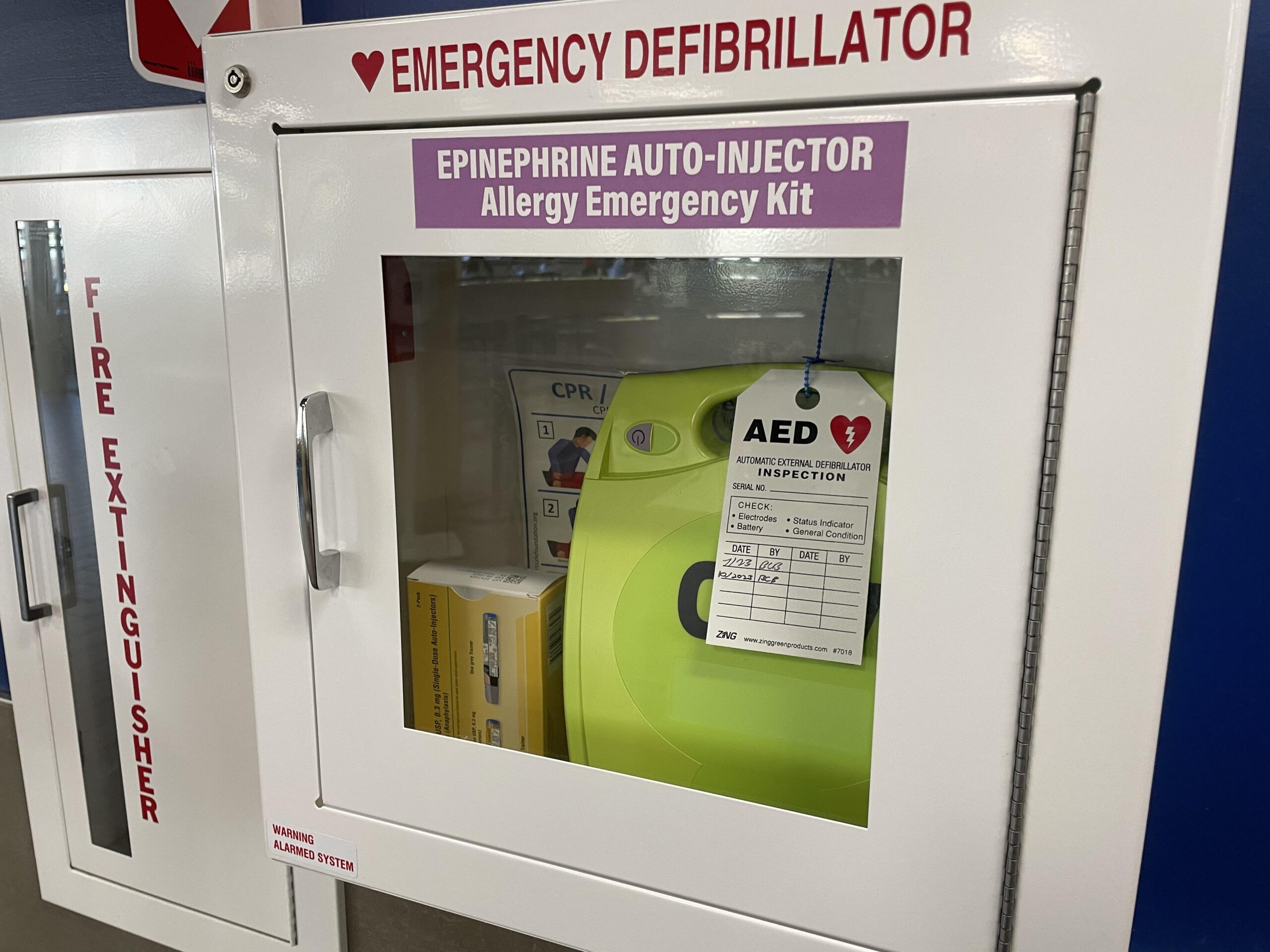EpiPens have been stocked in the University of Rhode Island’s main dining halls through a collaborative effort between Dining Services, Health Services and the Office of Emergency Management.
Located in emergency boxes, auto-injectors containing epinephrine, known as EpiPens, are available in the Ram’s Den, Mainfare Dining Hall and Butterfield Dining Hall, according to Health Services Nursing Coordinator Jennifer Strollo.
The emergency boxes are newly labeled with a purple sign that reads, “Epinephrine Auto-Injector Allergy Emergency Kit.”
Epinephrine, according to EpiPen’s website , helps to relax the muscles in one’s airway to help someone in anaphylactic shock to breath.
This installment of EpiPens, according to Strollo, was initiated by Dining Service’s Registered Dietician Karen Orabona and Director Pierre St-Germain.
Strollo also commended the Assistant Director for Health Promotion and Wellness Jessica Greene for her help with this initiative.
Orabona said this initiative was in discussion before the COVID-19 pandemic. In the height of the pandemic, there were many needed health initiatives and less staff. All dining workers are currently required to undergo allergy training through the AllerTrain program by MenuTrinfo.
MenuTrinfo, according to their website, is a company that provides services with a mission of making dining services safe for people with allergies.
AllerTrain, according to Orabona, informs dining workers about allergens and how to administer an EpiPen. Orabona, a certified AllerTrainer, holds annual training for dining workers.
Effective in 2018, the Rhode Island Department of Health enacted the “Rules and Regulations Pertaining to Acquiring and Stocking Epinephrine Auto-Injectors for Emergency Administration” [R23-6.4-EPI] . This enabled entities like URI to carry stocked EpiPens, according to Orabona.
Through MenuTrinfo, URI dining managers have completed, or will complete, the AllerTrain Entity program, according to Orabona. This training is specific to entities that are able to stock Epinephrine under state legislation, like URI.
This program, able to be completed online, is a 30-minute training specific to anaphylaxis. According to MenuTrinfo’s website , this training helps one recognize signs and symptoms of anaphylaxis and the administration of epinephrine using multiple auto-injectors types.
With the installment of the EpiPens in the dining halls during late October, more training was seen as necessary by dining and health services.
Health service workers, led by Strollo, gave a combined training for Ram’s Den student workers and managers on EpiPen administration and CPR. Strollo used training EpiPens and CPR dolls for simulation purposes. Orabona plans to implement this in-person training to other dining halls.
“It’s more hands-on, so they can actually feel [the EpiPen] in their hands,” Strollo said. “It’s nice that you can watch a video, but to have somebody there to instruct you was great for the dining staff.”
According to Food Allergy Research and Education’s website, 200,000 people in the United States require emergency medical aid for allergic reactions to food products.
A response to anaphylactic shock should be quick, according to Strollo. Symptoms can present themselves in different ways, like a scratchy throat or rash. However, an individual’s throat can close rather quickly, and Benadryl won’t combat anaphylaxis like Epinephrine will, according to Strollo.
“It’s very timely, a reaction from an allergic person to the protein they’re allergic to,” Orabona said. “It can happen within seconds, or it can take a couple of hours.”
Dining service workers, according to Orabona, are presented with a step by step procedure for when an individual is anaphylaxis. Workers should call emergency services, ask if the individual has an EpiPen, and assist with administration if needed. If the individual does not have an EpiPen, the stocked Epinephrine can be administered.
Although these stocked EpiPens are readily available, students are encouraged to always carry theirs if they have one, according to Strollo.
Strollo said some students who are transitioning to college have yet to know how to properly advocate for their health needs.
“It’s our job here to continue to educate, to encourage students to manage their own health issues, and to promote ways to care for themselves,” Strollo said.
The lack of parentage creates a sense of responsibility for Health Services to reiterate the importance of carrying an EpiPen, according to Strollo.
Strollo and Health Services workers support students in a variety of ways in their clinic. Advocated by the Office of Disability Access and Inclusion, some students are deemed to need special health guidance by the Health Services. This can include assistance with injections or infusions. These students, who are unable to administer epinephrine, benefit from this training in dining services.
In 2019, the number of United States residents with food allergies was estimated to be 32 million, according to Orabona. In 2011, this number was 15 million. This statistic alludes to the increased need for allergy care.
As well as future training initiatives for more dining workers, Orabana said EpiPens were ordered to be installed in Brookside Bistro.

